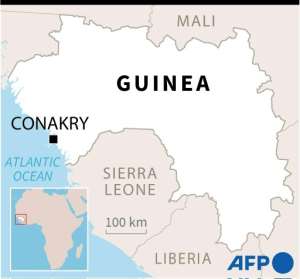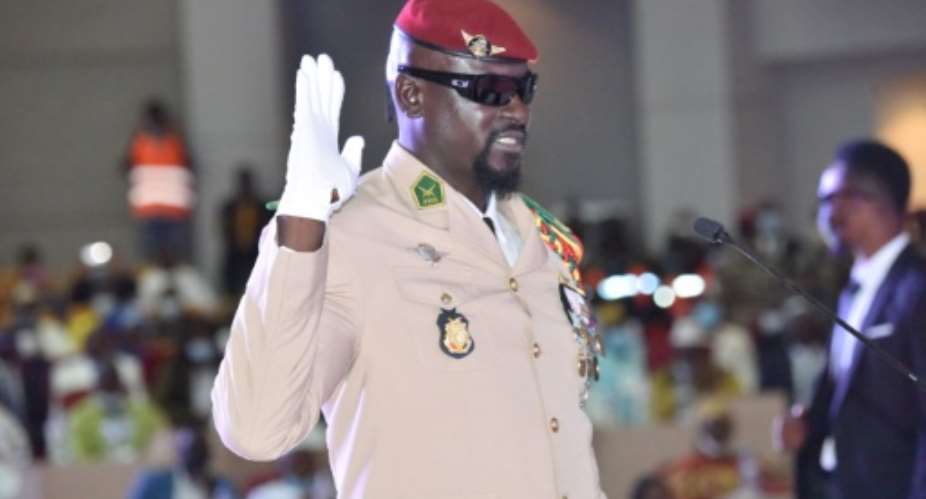Guinea's newly appointed prime minister Mohamed Beavogui pledged Thursday that his transition government would take on reforms to make sure the country "works properly" before handing power back to civilians after last month's coup.
Speaking to reporters outside his home in the capital Conakry, Beavogui said that his priorities are those of the ruling military, which seized power in the West African state on September 5.
Beavogui, a relative unknown in Guinean politics with a background in international development, explained that he wants to ensure "the country works properly" -- apparently referring to a dysfunctional government bureaucracy and courts system -- before promised elections are held.
Guinea's ruling junta named international development veteran Beavogui as prime minister on Wednesday.
The following day, the 68-year-old offered assurances that neither he nor army strongman Colonel Mamady Doumbouya plan to cling to power.
"We are here, as the president said, to serve, to create these conditions, and to leave," Beavogui said.
Doumbouya, 37, deposed elected president Alpha Conde last month.
The former special-forces commander was sworn in as interim president on October 1, and has promised to restore civilian rule after a transition period of unspecified length.
 Army strongman Colonel Mamady Doumbouya seized power last month. By Cellou BINANI (AFP/File)
Army strongman Colonel Mamady Doumbouya seized power last month. By Cellou BINANI (AFP/File)
The junta also unveiled a "transition charter" late last month that includes plans to revise the constitution, reform electoral rules and hold "free, democratic and transparent elections."
Beavogui had a prestigious career in international development, including with the United Nations, before the army appointed him to steer the transition government.
His lack of government experience potentially distances him from Guinea's vicious political infighting.
Locals, for their part, appear to have welcomed his nomination.
Mohamed Sall, a 53-year-old bank employee in Conakry, told AFP that the prime minister "has clean hands, a clear conscience and a holy spirit".
'Irreversible reforms'
Under the transition charter, Doumbouya retains the power to hire and fire the prime minister as well as government ministers.
However, the president and other members of the transition government will be barred from running in future elections.
On Thursday, Beavogui admitted that the ambitious reform plans "will probably not be finished" on his watch.
"We want to put in place reforms that will be irreversible," he said.
 Guinea. By Gillian HANDYSIDE (AFP)
Guinea. By Gillian HANDYSIDE (AFP)
The challenge facing the new prime minister is daunting.
Guinea, a nation of 13 million people, is one of the poorest countries in the world and has a long history of authoritarian rule.
Its electoral politics are also riven by ethnic tensions that often spill over into violence.
Guinean political scientist Kabinet Fofana said that Beavogui's technocratic background was "essential" for the task of carrying out reforms.
"The second advantage is that he is not politically affiliated, which is very important in a process where there must be elections," he added.
Wary of democratic backsliding in the region, Guinea's neighbours are pressuring the junta to organise swift elections.
The 15-nation Economic Community of West African States has frozen the financial assets of junta members and called for a poll within six months.
While Doumbouya has refused to commit to a timetable, experts say that his appointment of a civilian as prime minister may smooth tensions.
Last month's coup ousted 83-year-old Alpha Conde after months of brewing discontent with his administration.
A former opposition figure, Conde became Guinea's first democratically elected president in 2010 and was re-elected in 2015.
But last year, he pushed through a new constitution enabling him to run for a third term in October 2020.
The move sparked mass demonstrations in which dozens of protesters were killed. Conde won the election but the political opposition maintained the poll was a sham.





 We’ll protect state wealth from opaque deals – Prof Jane Naana
We’ll protect state wealth from opaque deals – Prof Jane Naana
 Mauritania president says running for second term in June polls
Mauritania president says running for second term in June polls
 I won't ever say I was a mere driver’s mate' — Prof. Opoku-Agyemang
I won't ever say I was a mere driver’s mate' — Prof. Opoku-Agyemang
 2024 polls: 'EC struggling to defend credibility'— Prof. Opoku-Agyemang
2024 polls: 'EC struggling to defend credibility'— Prof. Opoku-Agyemang
 Akufo-Addo gov't's 'greed, unbridled arrogance, unrestrained impunity, sheer dis...
Akufo-Addo gov't's 'greed, unbridled arrogance, unrestrained impunity, sheer dis...
 Election 2024: Ghana needs an urgent reset, a leadership that is inspiring – Ma...
Election 2024: Ghana needs an urgent reset, a leadership that is inspiring – Ma...
 Partner NDC to rollout a future of limitless prospects – Prof Jane Naana Opoku-A...
Partner NDC to rollout a future of limitless prospects – Prof Jane Naana Opoku-A...
 NPP will remain in gov’t till Jesus comes — Diana Asamoah
NPP will remain in gov’t till Jesus comes — Diana Asamoah
 Sunyani Technical University demands apology from former SRC president over sex-...
Sunyani Technical University demands apology from former SRC president over sex-...
 'Dumsor' was resolved by Mahama but ‘incompetent' Akufo-Addo has destroyed the g...
'Dumsor' was resolved by Mahama but ‘incompetent' Akufo-Addo has destroyed the g...
